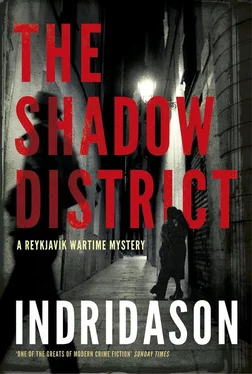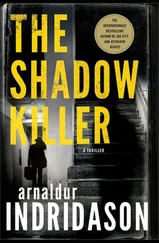‘And he told you all this?’
‘Well, I drew it out of him. I’d never have believed he was capable of such a thing. He was quite distraught — after the event. If it’s true, then naturally his behaviour was reprehensible.’
‘Was Jónatan aware that she’d been carrying his child and had an abortion?’
‘I very much doubt that,’ said Hólmbert. ‘At all events, he didn’t breathe a word about it.’
‘Did he openly admit to having killed her?’
‘He more or less came right out and said so.’
‘Whatever for?’
‘I think she’d threatened to report him. I was getting ready to pass all of this on to the police but couldn’t bring myself to do it straight away because... I knew Jónatan quite well. It was painful, and I could hardly believe it.’
‘He’s a relation of your mother’s?’
‘I suppose that was part of it,’ said Hólmbert, looking a little shamefaced. ‘Of course I urged Jónatan to come clean of his own accord because frankly I found the whole thing deeply shocking. And, as I said, I could tell he was suffering. I haven’t breathed a word of this to another soul, by the way; not even to my family.’
‘Not even to your father?’
‘No. Not to a soul.’
‘Did Jónatan happen to mention another girl, called Hrund?’
Hólmbert frowned pensively, then shook his head. He had a thin face, fair, prematurely receding hair, and a small mouth with lips so thin they formed a single line above his chin. His nose was narrow and finely sculpted and his whole appearance conveyed an air of sensitivity.
‘She lived in Öxarfjördur,’ said Flóvent. ‘Jónatan was working on the roads there when she disappeared.’
‘No, he only mentioned the one girl.’
‘What made him do it, do you think?’
Hólmbert stubbed out his cigarette. ‘As far as I could work out, it was the promiscuity that got to him. The Situation. He loathed it — the way women and girls were making sluts of themselves, running after the soldiers and the way the soldiers used them. He thought it was disgraceful. That came as no surprise to me because he’d often ranted about it. About how debauched and squalid the Situation was. It really got to him.’
‘And Rósamunda was forced to pay the price?’
‘Well, I don’t know if it was exactly like that, but those were his views,’ said Hólmbert. ‘Look, I’d be grateful if you could leave my name out of this. I feel rather a heel for telling you, as if I... Of course, I should have alerted you earlier. But we were good pals, you see, Jónatan and I.’
At that moment the door opened and the member of parliament reappeared and closed it carefully behind him.
‘Please forgive me,’ he said to Flóvent. ‘Has Hólmbert been able to provide any assistance? It’s shattering news you’ve brought us. I’ve already made arrangements to get in touch with his parents. In the circumstances I imagine they’d rather this whole affair was kept quiet. That the poor boy’s funeral should be conducted in private. There’s nothing standing in the way of that, is there?’
‘I don’t believe so,’ said Flóvent. ‘They’re free to collect his body for burial whenever they like, although the inquiry’s still in progress.’
‘Still in progress? Why’s that?’
‘Because we still need to interview his parents, piece the story together, verify the odd detail here and there. Your son has already been extremely helpful in that regard.’
‘I do appreciate that you’re only doing your job, officer, but don’t you think his parents will suffer enough without your interrogating them about this whole unfortunate business? From what you’ve told us, it sounds like an open and shut case. If you like, I could have a word with your superiors about winding it up.’
‘Well, sir, with all due respect, that—’
‘This matter impinges more or less directly on my family,’ continued the MP, his voice taking on an authoritative edge. ‘I do hope you understand my position. It’s unfortunate and could become very awkward if we don’t take steps to limit the damage. The boy was here in Reykjavík under our protection, thanks to my wife’s generosity and the family connection, but I’d be sorry if we were all dragged through the mud because of him. Merely because we offered him a helping hand. Naturally we feel a great deal of pity for the poor boy and the way he was led astray, and, it goes without saying, for the unfortunate girl, but that’s not the issue. The issue is how to prevent the damage from spreading any further than it already has. The situation is regrettable enough as it is. Do you follow me?’
The MP and his wife had used their time well, Flóvent reflected; he suspected that this had been their real reason for leaving the room.
‘You can count on me to act with discretion, sir,’ he said, ‘and you’re welcome to talk to my superiors, should you so wish. I appreciate that this is going to be an ordeal for all concerned, and I’ll bear that in mind.’
‘That’s all I wanted to hear,’ said the MP. ‘This is an extremely sensitive matter. Best to draw a tactful veil over it in the circumstances.’
Konrád sat in his kitchen in Árbær, sipping red wine and contemplating his visit to Magnús in Borgarnes. Helena Eyjólfsdóttir was crooning ‘The City Is Sleeping’ on the stereo, and as the old hit played on, he could feel a sense of calm spreading through his body. He was dog-tired from the drive, from struggling to make sense of what he had unearthed, but at the same time he felt satisfied with the progress he had made. Sensed that he was tantalisingly close to a breakthrough. Tomorrow he would go and see the other brother, Hólmbert, in defiance of Magnús’s warning that it would be a waste of time. He was convinced that Thorson had tried to make contact with Hólmbert, that it was one of the last things he had done. And Konrád wanted to know if he had succeeded.
He reviewed the evidence so far: Rósamunda had been assaulted, possibly at the member of parliament’s house, and refused to run any more errands there for her boss. The member of parliament in question had been on a visit up north at the time of Hrund’s disappearance. Both girls were around the same age and both had blamed, or been ordered to blame, the huldufólk for their assaults. Was it conceivable that the MP himself had been involved? Was that the conclusion Thorson had reached? If so, why had the significance only belatedly struck him now, rather than at the time, in 1944? And what had precipitated his recent enquiries relating to the case? He had apparently been badly shaken when he learnt of Rósamunda’s refusal to set foot in the MP’s house. Some aspect of the original investigation must have triggered that reaction. He must have had a revelation.
Konrád didn’t know much about the MP beyond the date of his death, so he went online again to refresh his memory of the man’s career. Shortly after the inauguration of the republic in 1944, he had retired from politics and acquired an import company that was not only still in business but had grown to become one of the largest of its kind in Iceland. He was rumoured to have exploited his political connections during the years when currency was hard to come by and imports were tightly controlled. Despite withdrawing from mainstream politics, he had remained active behind the scenes of his party and died at a grand old age in the 1970s. The company had passed down to his son, Hólmbert, whom the MP had allegedly favoured over his other children.
They had made their fortune and enjoyed the rewards, thought Konrád as he went into the sitting room to put another Helena Eyjólfsdóttir record on the turntable. While he was up, he opened a second bottle of wine, then sat down again in the kitchen letting the dulcet tones wash over him. He sat in his usual spot, watching the sun set over the city, and thought about the disputes that tore families apart. Money — such a paltry reason to fall out with your kin. Magnús and Hólmbert, the MP’s only surviving children, hadn’t spoken for decades because of it. Even after Hólmbert became seriously ill, Magnús couldn’t bring himself to visit him, hiding behind the excuse that it was too late.
Читать дальше












